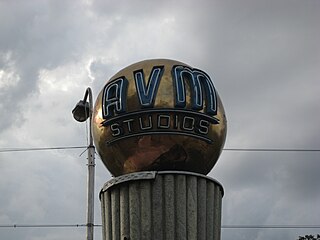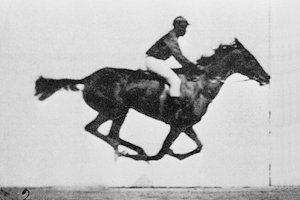
The Lumière brothers, Auguste Marie Louis Nicolas and Louis Jean, were among the first filmmakers in history. They patented an improved cinematograph, which in contrast to Thomas Edison's "peepshow" kinetoscope allowed simultaneous viewing by multiple parties.

Hindi cinema, often known as Bollywood and formerly as Bombay cinema, is the Indian Hindi-language film industry based in Mumbai. The term is a portmanteau of "Bombay" and "Hollywood". The industry is related to Tamil film industry (Kollywood), Telugu film industry (Tollywood) and other industries, making up Indian Cinema – the world's largest.

A movie theater, cinema, or cinema hall, also known as a picture house or the pictures, is a building that contains auditoria for viewing films for entertainment. Most, but not all, theaters are commercial operations catering to the general public, who attend by purchasing a ticket. Some movie theaters, however, are operated by non-profit organizations or societies that charge members a membership fee to view films.
The British Academy of Film and Television Arts or BAFTA Film Awards are presented in an annual award show hosted by the British Academy of Film and Television Arts (BAFTA) to honour the best British and international contributions to film. The ceremonies were initially held at the flagship Odeon cinema in Leicester Square in London, before being held at the Royal Opera House from 2008 to 2016. Since 2017, the ceremony has been held at the Royal Albert Hall in London.

Malayalam cinema is the Indian film industry based in the southern state of Kerala, dedicated to the production of motion pictures in the Malayalam language. It is also known by the sobriquet Mollywood in various print and online media .Malayalam film industry is the fourth biggest film industry in India. The films produced here are known for their cinematography and story-driven realistic plots. Works such as Marana Simhasanam and Vanaprastham were screened in the Un Certain Regard section at the 1999 Cannes Film Festival. Marana Simhasanam garnered the coveted Caméra d'Or for that year.
The Cinema of Albania refers to the film industry based in Albania and comprises the art of films and movies made within the country or by Albanian directors abroad. Albania has had an active cinema industry since 1897 and began strong activities in 1940 after the foundation of both the Kinostudio Shqiperia e Re and National Center of Cinematography in Tirana.

The British Independent Film Awards (BIFA) is an organisation that celebrates, supports and promotes British independent cinema and filmmaking talent in United Kingdom. Nominations for the annual awards ceremony are announced in early November, with the ceremony itself taking place in early December.

Abbas Kiarostami was an Iranian film director, screenwriter, poet, photographer, and film producer. An active film-maker from 1970, Kiarostami had been involved in the production of over forty films, including shorts and documentaries. Kiarostami attained critical acclaim for directing the Koker trilogy (1987–1994), Close-Up (1990), The Wind Will Carry Us (1999), and Taste of Cherry (1997), which was awarded the Palme d'Or at the Cannes Film Festival that year. In later works, Certified Copy (2010) and Like Someone in Love (2012), he filmed for the first time outside Iran: in Italy and Japan, respectively. His films Where Is the Friend’s Home?, Close-Up, and The Wind Will Carry Us were ranked among the 100 best foreign films in a 2018 critics’ poll by BBC Culture. Close-Up was also ranked one of the 50 greatest movies of all time in the famous decennial Sight & Sound poll conducted in 2012.

The cinema of India consists of films produced in the nation of India. Cinema is immensely popular in India, with as many as 1,600 films produced in various languages every year. Indian cinema produces more films watched by more people than any other country; in 2011, over 3.5 billion tickets were sold across India, 900,000 more than Hollywood. Mumbai, Chennai, Bengaluru and Hyderabad are the major centres of film production in India.

The film industry or motion picture industry, comprises the technological and commercial institutions of filmmaking, i.e., film production companies, film studios, cinematography, animation, film production, screenwriting, pre-production, post production, film festivals, distribution and actors, film directors and other film crew personnel. Though the expense involved in making films almost immediately led film production to concentrate under the auspices of standing production companies, advances in affordable film making equipment, and expansion of opportunities to acquire investment capital from outside the film industry itself, have allowed independent film production to evolve.
Experimental film, experimental cinema or avant-garde cinema is a mode of filmmaking that rigorously re-evaluates cinematic conventions and explores non-narrative forms and alternatives to traditional narratives or methods of working. Many experimental films, particularly early ones, relate to arts in other disciplines: painting, dance, literature and poetry, or arise from research and development of new technical resources.
Colonial cinema refers to the cinema produced by cinema of the colonizing nation in and about their colonies. While typically seen as a Western phenomenon, non-Western cases, most notably that of Imperial Japan, also had colonial cinemas. Colonial films typically idealized life in the colonies by emphasizing the modernizing aspects of colonization. Feature films set in colonial settings typically represented these parts of empire as refuges for colonizers looking to escape life in the metropole. As a result, colonial films frequently did not attempt to reflect the social realities of life in colonized countries. Representations of local characters, places, and customs were regularly presented as escapist, apologetic or overtly racist. Today colonial cinema is an important source to understand the mentality of the colonizing societies.

Brazilian cinema was introduced early in the 20th century but took some time to consolidate itself as a popular form of entertainment. The film industry of Brazil has gone through periods of ups and downs, a reflection of its dependency on state funding and incentives.
Postmodernist film is a classification for works that articulate the themes and ideas of postmodernism through the medium of cinema. Postmodernist film attempts to subvert the mainstream conventions of narrative structure and characterization, and tests the audience's suspension of disbelief. Typically, such films also break down the cultural divide between high and low art and often upend typical portrayals of gender, race, class, genre, and time with the goal of creating something that does not abide by traditional narrative expression.

Tamil cinema refers to Tamil-language motion pictures, which are primarily made in India. Based in the city of Chennai, Tamil Nadu, the hub of the Tamil film industry is in the Kodambakkam neighbourhood of Chennai. Kollywood is a colloquial term for this industry, the word being a portmanteau of Kodambakkam and Hollywood.

Film, also called movie or motion picture, is a medium used to simulate experiences that communicate ideas, stories, perceptions, feelings, beauty or atmosphere by the means of recorded or programmed moving images along with other sensory stimulations. The word "cinema", short for cinematography, is often used to refer to filmmaking and the film industry, and to the art form that is the result of it.
The 29th National Film Awards, presented by Directorate of Film Festivals, the organisation set up by Ministry of Information and Broadcasting, India to felicitate the best of Indian Cinema released in the year 1981. Ceremony took place in April 1982.

The 30th National Film Awards, presented by Directorate of Film Festivals, the organisation set up by Ministry of Information and Broadcasting, India to felicitate the best of Indian Cinema released in the year 1982. Ceremony took place in May 1983 and awards were given by then President of India, Giani Zail Singh.
The 31st National Film Awards, presented by Directorate of Film Festivals, the organisation set up by Ministry of Information and Broadcasting, India to felicitate the best of Indian Cinema released in the year 1983. Ceremony took place in June 1984 and awards were given by then Prime Minister of India, Indira Gandhi.













